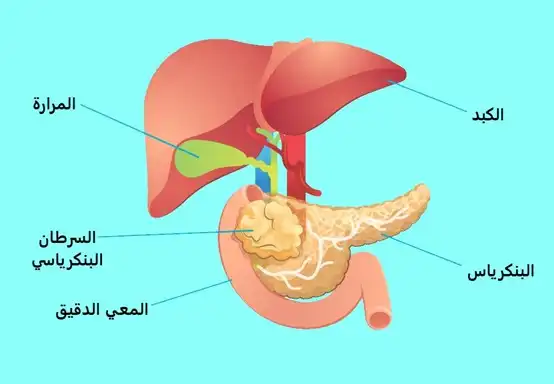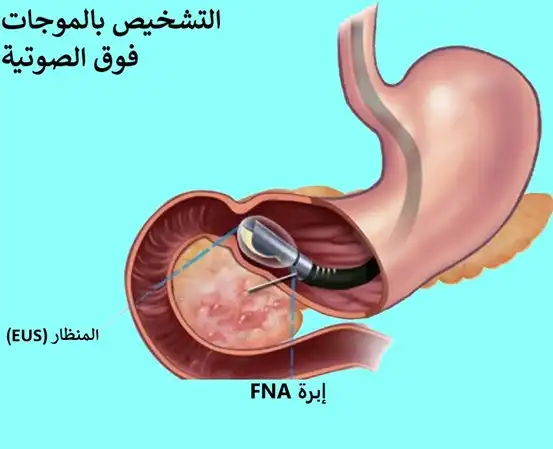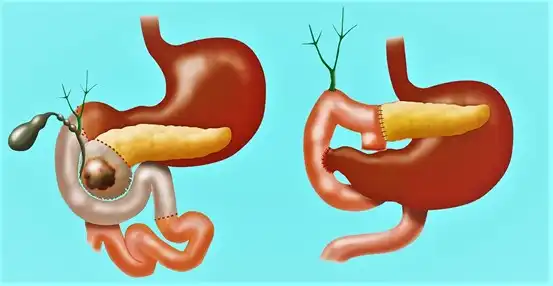سرطان البنكرياس يعتبر السبب الرابع للوفيات بالعالم، وقد شد سرطان المعثكلة انتباه أطباء تركيا، حيث يحتاج علاجه لخبرة وأدوات تشخيصية وعلاجية متقدمة تؤمنها مشافي تركيا.
عادة لا يتم تشخيص سرطان البنكرياس حتى مراحل متقدمة لأنه يصعب اكتشافه، حيث تشمل الأعراض اليرقان وفقدان الوزن وألم في البطن، وهذه الأعراض غير موجهة، وقد يخطأ الأطباء في تشخيص ورم المعثكلة، لذلك وجدت مراكز متخصصة في تركيا لسرطانة البنكرياس.
يعد السرطان البنكرياسي من أكثر السرطانات المميتة في العالم، حيث أنه مسؤول عن أكثر من 7% وفيات السرطان في العالم، فما هي اعراض هذا السرطان؟ وكيف يشخص ويعالج؟ تابع معنا في هذا المقال.
ما هو سرطان البنكرياس Pancreatic cancer؟
يحدث السرطان في البنكرياس عندما تتكاثر خلايا في البنكرياس Pancreas cells خارج نطاق السيطرة، يمكن أن ينتج عن ذلك كتلة من الأنسجة.
في بعض الأحيان، تكون هذه الكتلة حميدة (ليست سرطانية)، كما يمكن أن تكون الكتلة خبيثة (سرطانية) ونكون عندها أمام حالة ورم بنكرياسي.
تبلغ نسبة خطر الإصابة بسرطانة البنكرياس حوالي 1.6% على مدى الحياة، خطر الإصابة متساوي تقريباً بالنسبة للرجال والنساء، ويتراوح العمر النموذجي في وقت التشخيص بين 65-74 عاماً.
لمحة عامة عن البنكرياس
البنكرياس عبارة عن غدة من غدد الجهاز الهضمي تقع خلف المعدة، تتمثل الوظائف الرئيسية للبنكرياس في المساعدة في هضم الطعام وتنظيم مستويات السكر في الدم في الجسم.
يشارك البنكرياس في الحفاظ على مستويات السكر في الدم لأنه يصنع الأنسولين والغلوكاغون، وهما هرمونان يتحكمان في مستوى السكر في الدم.
البنكرياس تعتبر غدة خارجية الإفراز exocrine أيضاً بسبب وظيفتها في تصنيع الإنزيمات الهضمية (الأميلاز المعثكلي …) كما تعتبر في نفس الوقت غدة صماء لأنها تصنع هرمونات مثل الأنسولين والغلوكاغون.

انواع سرطان البنكرياس
هناك نوعان من الأورام التي تنمو في البنكرياس: هما أورام الغدد الخارجية الإفراز وأورام الغدد الصم العصبية.
حوالي 93٪ من السرطانات cancers التي تصيب البنكرياس هي أورام خارجية، ويسمى النوع الأكثر شيوعاً من سرطان البنكرياس بالسرطانة الغدية.
سرطان البنكرياس الغدي adenocarcinoma هو ما يعنيه الناس عادة عندما يقولون إنهم مصابون بسرطان البنكرياس، يبدأ النوع الأكثر شيوعاً في قنوات البنكرياس ويسمى سرطان الغدة القنوي.
هناك أشكال أكثر ندرة من الأورام الخارجية، منها ذلك الورم الذي يدعى الورم المخاطي داخل القناة (IPMN) والذي بدأ بالظهور بشكل أكبر في السنوات الأخيرة، حيث يبدأ هذا النوع بشكل ورم حميد، ولكنه يمكن أن ينمو ويصبح سرطانياً بمرور الوقت.
ما تبقى من أورام البنكرياس، حوالي 7٪ من الإجمالي، هي أورام الغدد الصم العصبية (NETs) وتدعى أورام الغدد الصم البنكرياسية (PNETs).
تسمى هذه الأورم أيضاً باسك أورام الخلايا الجزيرية أو سرطان الخلايا الجزيرية، إذا كان لديك ورم في الخلية الجزيرية، فقد يطلق عليه الأطباء اسماً بناءً على نوع الهرمون الذي تصنعه الخلية، على سبيل المثال سيكون الإنسولينوما اسماً للورم في الخلية التي تصنع الأنسولين.
قد تختلف أعراض سرطان الغدد الصماء في البنكرياس عن اعراض سرطانة البنكرياس التقليدية، مثل اليرقان أو فقدان الوزن، هذا لأن بعض PNETs تستمر بإفراز الهرمونات بشكل مفرط.
اسباب سرطان البنكرياس وعوامل خطورته
لا يوجد إجابة واضحة لذلك. لا نعرف ما الذي يسبب هذا السرطان بشكل دقيق، ولكن هناك بعض عوامل الخطر التي تسهم في ذلك.
شخص من أصل 64 شخص قد يصاب بسرطان المعثكلة بمرحلة ما من حياته، عامل الخطر هو شيء يزيد من فرصة الإصابة بمرض ما، فهناك عوامل خطر ناتجة عن السلوك ويمكن تغييرها، ومن عوامل الخطر هذه نذكر ما يلي:
- التدخين.
- الإصابة بمرض السكري، وخاصة مرض السكري من النوع 2 المرتبط بالسمنة، كما أن السكري معيار تشخيصي، حيث قد يكون ظهور مرض السكري في سن أكبر (على سبيل المثال، لدى شخص في السبعينيات من العمر) وفي شخص يتمتع بوزن طبيعي أو مؤشر كتلة جسم طبيعي علامة على الإصابة بسرطان غدة البنكرياس.
- السمنة، حيث يعتبر تراكم الدهون حول الخصر عامل خطر، حتى لو لم تكن بديناً بالمجمل.
- التعرض للمواد الكيميائية التي يستخدمها عمال التنظيف الجاف وعمال المعادن.
- الإصابة بالتهاب البنكرياس المزمن، والتهاب البنكرياس يرتبط أحيانًا بالتدخين وشرب الكثير من الكحول.
هناك أيضا عوامل خطر لا يمكنك تغييرها. وتشمل هذه العوامل:
- الوراثة، تتضمن بعض الشروط التي تسبب التهاب البنكرياس المزمن بما في ذلك التاريخ العائلي للإصابة بسرطان البنكرياس.
من المهم أيضًا معرفة أي تاريخ عائلي للإصابة بسرطان الثدي لأن الحالات الوراثية المرتبطة بسرطان الثدي، والتي تسمى متلازمات BRCA، ترتبط بسرطان البنكرياس. - العمر: أكبر من 40 عاماً.
- الجنس: لدى الرجال ميل أكبر للإصابة بهذا النوع من السرطان.
- أن تكون من أصل أفريقي أمريكي أو يهودي أشكنازي.
اعراض سرطان البنكرياس
لا تظهر أعراض سرطان البنكرياس دائماً، خاصة في المراحل المبكرة لذلك يصعب إكتشافه، ومع ذلك، فإن سرطان البنكرياس قد يسبب ما يلي:
- ألم في الجزء العلوي من البطن قد ينتشر إلى الظهر
- اصفرار الجلد وبياض العينين (اليرقان) مع حكة
- فقدان الشهية
- فقدان الوزن
- جلطات دموية
قد يشتبه مقدم الرعاية الصحية الخاص بك بإصابتك إذا كانت لديك بعض الأعراض وكنت قد أصبت مؤخراً بمرض السكري أو التهاب البنكرياس.
كيف يتم تشخيص سرطان البنكرياس في تركيا؟
من الصعب اكتشاف سرطانة البنكرياس في المراحل المبكرة. هذا لأن مقدمي الرعاية الصحية لا يمكنهم فحص البنكرياس في الفحص الروتيني.
إذا اشتبه مقدم الرعاية الصحية في احتمال إصابتك بسرطان المعثكلة، فقد يطلب إجراء صور شعاعية لرؤية البنكرياس بشكل واضح. يمكن أيضاً إجراء تصوير بالموجات فوق الصوتية بالمنظار.
يسمح مسبار الموجات فوق الصوتية في نهاية المنظار بتصوير البنكرياس من خلال جدار المعدة، إذا لزم الأمر، يمكن الحصول على خزعة (عينة من أنسجة البنكرياس) موجهة بالموجات فوق الصوتية من البنكرياس أثناء الإجراء.
يمكن لفحص الدم العثور على مادة تسمى واسم الورم، قد تشير المستويات العالية من شيء يسمى CA 19-9 لدى المريض إلى وجود ورم بنكرياسي.
وفقًا لـ توصيات اثنتين من أكبر منظمات السرطان، الشبكة الوطنية الشاملة للسرطان (NCCN) و الجمعية الأمريكية لعلم الأورام السريري (ASCO)، يجب على كل شخص تم تشخيص إصابته بسرطانة البنكرياس حديثاً التحدث إلى طبيبه حول إجراء استشارة واختبارات وراثية لمعرفة ما إذا كان هناك سبب وراثي لإصابته بسرطان المعثكلة.

إنَّ أعراض سرطان البنكرياس المبكرة مخاتلة، كما أن اعراض سرطان البنكرياس المرحلة الأخيرة قد تكون خطيرة وتحتاج للعناية الطبية الفورية، لذلك لا تتردد بالتواصل معنا، فإن مركز بيمارستان عائلتك في تركيا.
علاج سرطان البنكرياس بمختلف مراحله
يعتمد علاج سرطانة البنكرياس على أشياء معينة، بما في ذلك مكان الورم، والمرحلة التي يمر بها السرطان، والحالة العامة للمريض، وهل انتشر السرطان خارج البنكرياس أم لا.
في المراحل المتقدمة من السرطان، من غير المرجح أن يكون علاج سرطان البنكرياس فعالاً بحلول الوقت الذي يتم فيه التشخيص، غالبًا ما يكون قد فات الأوان للإزالة الجراحية الكاملة للبنكرياس. ومع ذلك، هناك طرق مختلفة لمحاولة علاج سرطان البنكرياس. وتشمل هذه الطرق:
- الاستئصال الجراحي للجزء السرطاني من البنكرياس، يمكن أيضاً إزالة العقد الليمفاوية القريبة من البنكرياس.
- العلاج الإشعاعي لقتل الخلايا السرطانية.
- العلاج الكيميائي في تركيا، تستخدم هذه الطريقة الأدوية التي تقتل الخلايا السرطانية.
- العلاج المناعي في تركيا، يساعد العلاج المناعي جسمك على محاربة السرطان، إلا أنه غير فعال إلى حد كبير ضد سرطان البنكرياس، ولكن قد يستفيد منه حوالي 1٪ من المصابين بسرطان البنكرياس إن كان لديهم طفرات جينية معينة.
- العلاج الموجه، العلاج الموجه يوجه إلى جينات أو بروتينات معينة تساعد على نمو السرطان، يتم إجراء الاختبار الجيني بشكل عام لمعرفة ما إذا كان العلاج الموجه مناسبًا لك.
يمكن استخدام العلاج الكيميائي و/أو الإشعاعي بدلاً من الجراحة، أو قبل الجراحة لتصغير الورم، أو بعد الجراحة للتأكد من موت جميع الخلايا السرطانية.
بالنسبة لسرطانة البنكرياس، قد يتضمن أيضاً طُرُقَاً لتحسين عملية الهضم والتحكم في مرض السكري.

إلى أين ينتشر سرطان البنكرياس؟ وما هي أحدث الدراسات حول سرطان البنكرياس؟
يميل سرطان المعثكلة، الذي لا يتم اكتشافه مبكراً غالباً، إلى الانتشار إلى العقد الليمفاوية القريبة، ثم إلى الكبد والصفاق (بطانة التجويف البطني) والرئتين.
إنَّ الدراسات حول هذا النوع من السرطان ما زالت مستمرة بشكل كبير، حيث أن لهذا السرطان نسبة وفاة عالية مقارنة بباقي الأنواع السرطانية.
حيث أشارت دراسة حديثة أجريت في جامعة بنسلفانيا أن حوالي 90 في المائة من سرطانات البنكرياس ناتجة عن طفرة في جين KRAS، وهو الجين الورمي الأكثر شيوعاً عبر أنواع السرطان.
وبهذا كان لإعطاء أدوية لتثبيط هذا الجين الورمي دور كبير في تثبيط نمو الورم البنكرياسي.
كما اتجهت الدراسات في الآونة الأخيرة إلى العلاج المناعي والبيولوجي، حيث يقول الأطباء أنّ سرطان البنكرياس من السرطانات الباردة التي لا تُهاجم عادة من قبل الجهاز المناعي بالشكل الكافي، لذلك تشير دراسة أُجريت على الفئران إلى طرق مختلفة تعمل على تعريض الورم البنكرياسي (أو جعله أكثر حرارةً) للجهاز المناعي ليسهل عليه القضاء عليه.
هل يمكن الوقاية من سرطان البنكرياس؟
لا نعرف ما الذي يسبب سرطان البنكرياس بالفعل، لذلك من الصعب معرفة كيفية الوقاية منه. ومع ذلك، يمكنك تغيير سلوكياتك اليومية لتصبح أكثر صحة.
قد تساعد هذه النصائح في تقليل خطر الإصابة بسرطان البنكرياس:
- لا تدخن. إذا كنت تدخن أو تستخدم التبغ بأي شكل من الأشكال، فحاول الإقلاع عنه.
- حاول الوصول إلى وزن طبيعي والحفاظ عليه من خلال تناول الطعام الصحي وممارسة الرياضة.
- حاول تجنب الإصابة بمرض السكري، وإذا كان لديك، تحكم في مستويات السكر في الدم.
- استخدم معدات السلامة إذا كان عملك يعرضك للسموم.
ما هي التوقعات بالنسبة للأشخاص المصابين بسرطان البنكرياس؟
عادة لا يتم تشخيص سرطان البنكرياس حتى المراحل المتقدمة، لذلك، فهو أحد الأسباب الرئيسية لوفيات السرطان.
بعد عام واحد، يبلغ معدل البقاء على قيد الحياة حوالي 20٪، بعد خمس سنوات، ينخفض هذا الرقم إلى حوالي 6٪، حيث أنه في كل عام، يموت حوالي 3000 شخص بسبب سرطانة البنكرياس أكثر من الذين يموتون بسبب سرطان الثدي في الولايات المتحدة.
إن كان من الممكن إجراء الجراحة وإزالة جزء من البنكرياس، فإن متوسط معدل البقاء على قيد الحياة هو 18 إلى 20 شهراً، يرتفع معدل البقاء على قيد الحياة لمدة خمس سنوات في مثل هذه الحالات إلى 10-25٪.
نهايةً نجد أن سرطان البنكرياس أحد أصعب السرطانات نظراً لصعوبة تشخيصه في المراحل المبكرة، لذلك عملت تركيا على تأمين أفضل طرق تشخيص وعلاج لهذا السرطان القاتل في حال عدم العلاج المبكر.
المصادر:

